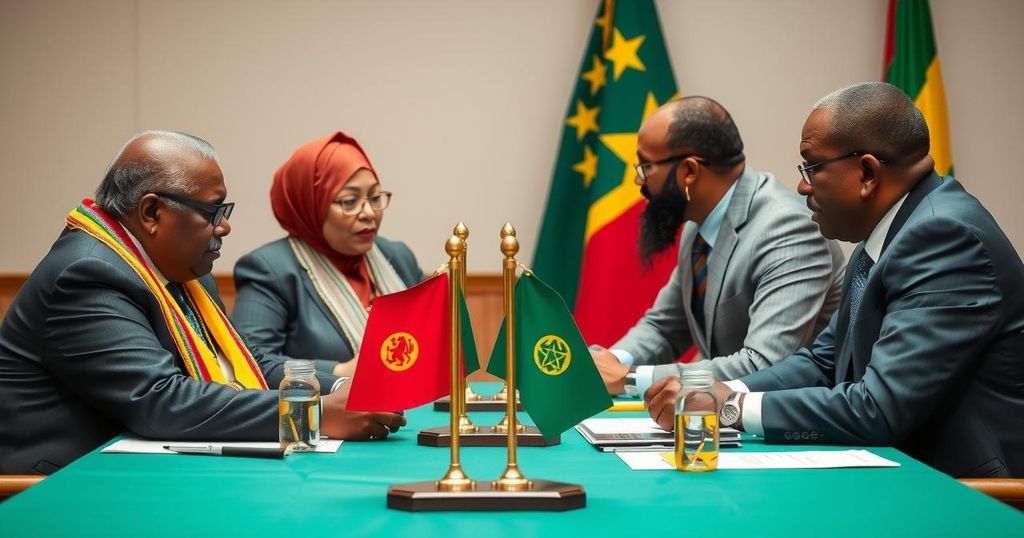Somali President and Ethiopian Prime Minister Schedule Talks Over Somaliland

Somali President Hassan Sheikh Mohamud and Ethiopian Prime Minister Abiy Ahmed are scheduled to meet in Ankara, Turkey, to discuss tensions over a maritime agreement with Somaliland. The agreement, deemed illegal by Somalia, has created friction between the two countries. Previous mediation efforts have failed, raising concerns about potential conflict.
Somali President Hassan Sheikh Mohamud and Ethiopian Prime Minister Abiy Ahmed are set to hold a meeting in Ankara, Turkey, as confirmed by Somali officials. The talks, which have been requested by Ethiopia, are expected to take place on Wednesday. The Somali leader is in Turkey upon an invitation from President Recep Tayyip Erdogan, whereas Ethiopian officials have not yet publicly acknowledged the upcoming discussions.
This meeting marks the first engagement between the two leaders following a dispute surrounding a maritime agreement made by Ethiopia with the self-declared independent region of Somaliland. Signed on January 1, this agreement allows Ethiopia access to a 20-kilometer section of coastline along the Red Sea near the Gulf of Aden, while purportedly recognizing Somaliland’s claims to independence. The Somali government has deemed this agreement illegal, asserting that it undermines its sovereignty and territorial integrity, as it considers Somaliland to be part of its territory. Ethiopia, on the other hand, asserts that it respects Somalia’s sovereignty and does not intend to compromise it.
Somaliland declared independence in 1991 but continues to lack international recognition as a sovereign state. Additionally, Somalia expects the withdrawal of all Ethiopian troops by the end of the month, coinciding with the expiration of the mandate for the African Union Transition Mission in Somalia. Previous negotiations mediated by Turkey in July and August have not succeeded in resolving the ongoing dispute, wherein Somalia has demanded Ethiopia’s withdrawal from the maritime agreement.
In September, President Mohamud declined a meeting with Prime Minister Abiy during a forum in Beijing, citing the necessity for Ethiopia to first retract its agreement with Somaliland. Additionally, efforts by leaders from Djibouti, Mauritania, and former Nigerian President Olusegun Obasanjo to mediate have proven unsuccessful, as have attempts by the Kenyan government. Nevertheless, Kenyan President William Ruto and Ugandan President Yoweri Museveni have expressed their willingness to facilitate dialogue between Ethiopia and Somalia.
The tension between Somalia and Ethiopia originates from a maritime agreement signed between Ethiopia and Somaliland, which is seen as a separatist region by the Somali government. The agreement is contentious as it includes territorial considerations that Somalia claims infringe upon its sovereignty. Somalia’s longstanding view is rooted in historical governance over Somaliland, with its administration declaring independence in 1991 without international acknowledgment. This situation raises concerns about potential escalations of conflict in the volatile Horn of Africa region, as ongoing diplomatic efforts for resolution have not succeeded in the past months. Furthermore, the nearing departure of Ethiopian troops due to the expiration of their mission adds another layer of urgency to these discussions.
In summary, the upcoming meeting between Somali President Hassan Sheikh Mohamud and Ethiopian Prime Minister Abiy Ahmed signifies an essential moment in addressing their contentious maritime agreement involving Somaliland. Despite previous attempts at dialogue yielding no results, there remains a hope that this meeting may foster a clearer understanding and potential resolution of the ongoing conflict over territorial integrity. The outcome of these discussions could have significant implications for relations within the Horn of Africa region moving forward.
Original Source: www.voanews.com








